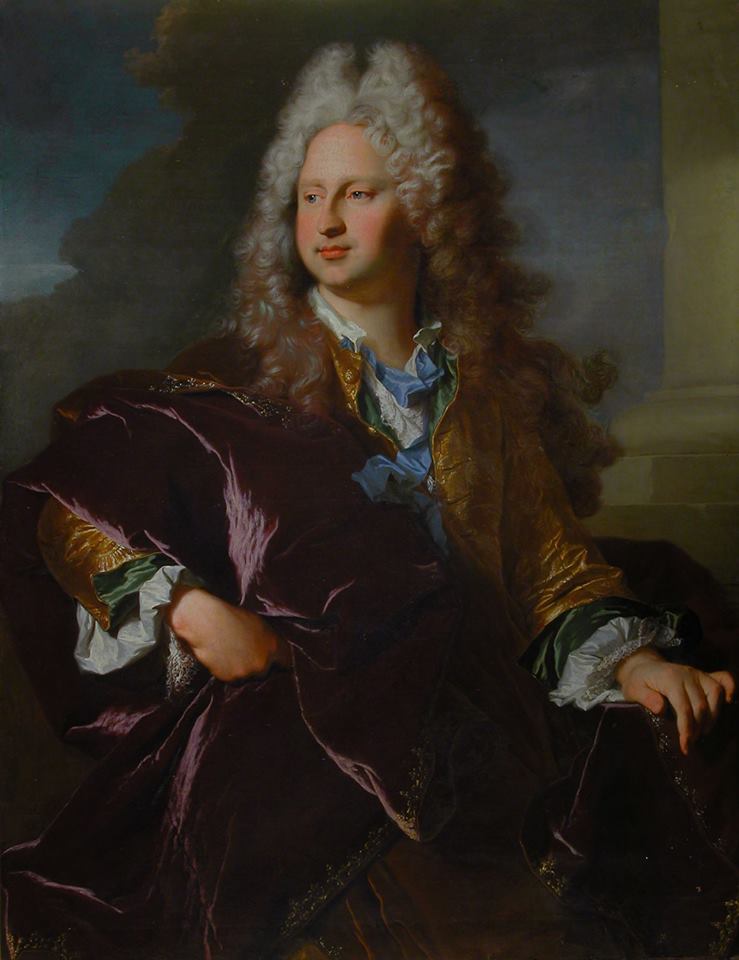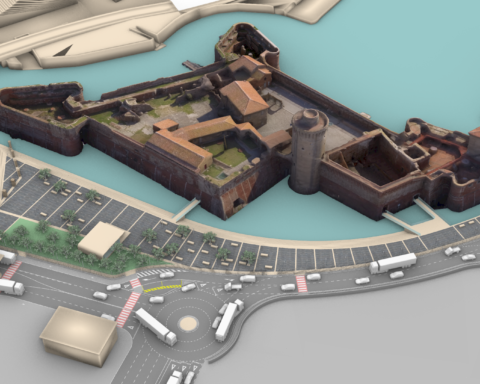Article published in the “Rivista Italiana di Studi Napoleonici” (Italian Napoleonic Studies Magazine) n. 22-23 February-June 1969
In the diplomatic correspondence of Don Neri Corsini Senior (in the portrait above) from Paris during the year 1796, we find three documents concerning the events in Portoferraio during the French occupation of the city of Livorno.
It is an important episode in the history of Italy in 1796-1797; we have collected very rich archive material on those two years. This enabled us to get a precise, complete idea of the importance that the island of Elba and the strong and safe harbour of Portoferraio, it’s main town, had in that period. It is no exaggeration to say that this was when the island was one of the strategic positions in the Tyrrhenian sea that was fiercely contended between the English and French.
In order to understand the situation on the island in ’96 and ’97 we have to go back to the scenario as it was at that time. Above all, we must bear in mind the condition of Livorno during the period of the French occupation.
The loss of this city and its port, so important for the survival of Tuscany, was a real tragedy right from the very first few days.
Livorno and its port were the lungs that allowed Tuscany to live and breathe. The occupation of the city meant the immediate cessation of almost all Tuscan trade, which was largely done by sea.
Communications were slow and difficult, and, for instance, reaching France from Tuscany by land meant a journey that took many days that was very tiring and not easy in times of war.
Warned of General Bonaparte’s arrival a few days in advance, they had time to rescue or hide most of their goods. However, many of them also fell into the hands of the French who immediately began to violently harass them precisely because, they said, the English merchants had been given warning of the imminent arrival of the French.
The Jewish community was subjected to very harsh extortion, because it was said that the Jews were the most popular community with the English. But above all, the arrivals of foreign goods and the departures of Tuscan goods ceased.
All trade in Livorno came to a halt from one day to the next and the city was paralyzed: famine, unemployment and misery began.
But this did not only affect Livorno: the whole of Tuscany suffered and began to encounter all kinds of difficulties.
The documents of the time (there is an impressive amount of documentation on this issue in Florence’s State Archives) offer a dramatic picture of the consequences of that situation; the outcries that the Tuscan authorities make are desperate and dramatic. The depiction of desolation, disorder, misery and hunger is shocking.
Il governo toscano non si stancava di supplicare il suo rappresentante a Parigi, don Neri Corsini, affinché intervenisse presso il Direttorio perché la tragedia di Livorno e della Toscana avesse fine. Le
The Tuscan government continued to plea with its representative in Paris, Don Neri Corsini, to intervene with the French Directorate to end the tragedy in Livorno and Tuscany. The statements were always the same: Livorno is reduced to starvation, Tuscany is desperate; it is impossible to go on like this. The Tuscan government warned of serious unrest, riots, revolts. What happened then?
The French generals told the government not to worry; they knew very well how to curb the starving populations. Words that frighten the Tuscan government: what would have happened if a large number of the population in revolt had taken to the streets? It is a legitimate question that we ask ourselves too. Wouldn’t Livorno’s Easter insurrections have taken place well long before the Veronese ones? In Livorno, in Florence, all over Tuscany, desperation and terror were spreading.
The Corsican battalion, consisting of about 150 or 200 Corsicans that had escaped to France, had come down to Livorno with the French troops, ready, should the opportunity arise, to try to reconquer Corsica that had been taken over by the English. These Corsican volunteers were turbulent, undisciplined, quarrelsome and sowed terror everywhere.
Don Neri received his government’s invocations, pleas, protests in Paris, and as a result he too became terrorized. Tuscany’s salvation depended on the French leaving, for the port and the city of Livorno to be free and neutral once again.
However, a few days after the French took over Livorno, the English occupied Portoferraio. Hence the situation gets more complicated, almost desperate, and, above all, is reiterated.
It is now clear that, to make matters worse, the scenario has changed: from military and strategic it has become a question of prestige, or rather the question of prestige overlaps with the strategic one; with the British in Portoferraio it is not possible to predict the end.
The English declare that they will stay in Portoferraio for the safety of their fleets, as long as the French remain in Livorno. The French, for their part, declare that they will stay in Livorno as long as the British occupy Portoferraio.
How can the situation be solved, when there seems to be no way out? For Tuscany, it has become a question of life or death. A solution has to be found and found soon, indeed straight away.
In Paris, Don Neri Corsini is the ‘reception point’ (so to speak) for complaints and outcries that come from his city. It seems to him that the solution, to a certain extent at least, depends on him and therefore it is his duty to find it. At this point, his intelligent, open, fertile, very inventive mind, elaborates a plan that seems feasible and clear to him: the Tuscan government should give permission to France to occupy Portoferraio and the island of Elba, taking the place of the English.
France will therefore be able to abandon the port of Livorno, having received Portoferraio as compensation. From this strategic position the French will be able to control the Tyrrhenian sea, keeping England at bay, and the port of Livorno will be neutral again and the Tuscan economy will be saved.
This was Don Neri Corsini’s strategy. A plan that he thought would be quick and easy to carry out, one which would satisfy the French demands. The English, for their part, instead of Livorno and Elba, for the time being would be able to continue occupying Corsica. The satisfaction of all concerned would lead to a kind of stability in the Tyrrhenian Sea.
Up to now this episode has been ignored. This is the first time that it has come to light together with documents to support it. The fact that Corsini’s plan was really so easy to implement and infallible, is another matter. In my opinion this was not the case.
First of all, France had to be able to face the English fleet in the Tyrrhenian Sea and in the Mediterranean. This was not possible. England also had to accept the plan, and this seemed unlikely, at the very least.
France and England had to be willing to respect the neutrality of the port of Livorno again, and at that time it seemed even more impossible.
Don Neri Corsini, however politically expert and shrewd he was, was deluding himself. However, the episode is of considerable importance. It shows how significant the control of the island of Elba was at that time for both France and England. Corsini’s documents contain considerations on Elba and the possession of the island that seem historically important to us.
From an examination of his memoirs on the island – from the type of paper used, from his writing, from his corrections – it is clear that it was written by Corsini himself. The document was then submitted by him, even before consulting the Tuscan government, to the attention and study of some Directory members and subsequently transmitted to the Tuscan government.
This appears to have been the procedure Corsini followed in his attempt. It is also more than likely that the Directory sent the memorial to General Bonaparte, as the supreme judge in Italy at that time.
We know that in similar cases General Bonaparte was kept informed, his opinion was asked, his suggestions and advice were sought. To be succinct, he was left to make the final decision. We lack the evidence, but it is likely that, even in this case, things went that way.
Corsini’s proposal, however, was neither accepted by the Tuscan government nor by the Directorate. It is likely that it was not accepted by General Bonaparte either, who was too aware of the difficulties that the implementation of such a project would have entailed, and eager to find a different option as part of a complete solution to the Italian problem.
The outcome of the war, in other words, would have solved this as well as the other problems that were even more important than this.
The document remains, we repeat, as confirmation of the dramatic scenario in Livorno and of the absolute necessity that the Tuscan government had for the port to be free and neutral once more, and to overcome that difficult stalemate.
An episode, let’s say once again, that has only come to light now: it isn’t mentioned in the very meticulous Zobi, Reumont does not mention it: so many things are still unknown or badly recorded in the history of Elba during that period!
Translation by Giles Foster




